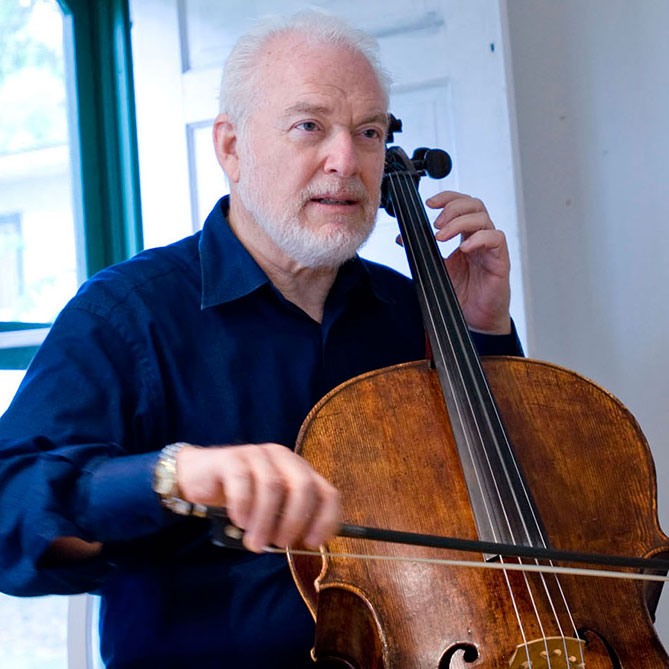
An Interview with Paul Katz on “Talent Has Hunger”
Blogmaster
Talent Has Hunger is an inspiring film about the power of music to consume, enhance, and propel lives. Filmed over 7 years, the documentary offers a window into the mysterious world of the artist, and focuses on the challenges of guiding gifted young people through the struggles of mastering the cello. The film features the mentorship of master teacher Paul Katz, the founder of CelloBello. He joined our website blogmaster, Francesca McNeeley, for an interview to discuss the film and its impact:
For people who may not realize the connection between this film and CelloBello, would you mind briefly talking about their shared history?
About 10 years ago there was a cellist who went to Harvard and did her doctoral dissertation in legacy and mentoring; she made myself and my class the subject of her paper. She spent two and a half years filming my lessons, interviewing me, interviewing my students, and then she wrote a 250-page dissertation for Harvard—with added video clips. From that the idea of making a DVD for cellists developed.
We took this idea to the WGBH Educational Media Foundation and they liked what they saw in my teaching, etcetera. They then came back and proposed a PBS film. They also suggested that instead of a DVD, a better way to go, pedagogically, would be a website. This was back in 2007; a lot has happened in the last 10 years, but at that time that was pretty cutting edge thinking. So they pushed me in that way.
The idea first was to make a film, but after we started filming we ran into budgetary problems when the stock market crashed. The film was put on hold, but from that footage—there was about 80 hours of footage at that point—we got the idea that maybe we should do a website before the film. It had originally been thought of the other way around.
So CelloBello, with the help of WGBH and the New England Conservatory, was created in 2010. Then in 2014 Josh Aronson, the producer of Talent Has Hunger, came back and said “let’s finish the film.” In the end there was this four year period where there was no filming at all, which actually works out very well for the movie. We were able to see my freshman class coming in and then graduating and going out into the world—which Josh felt made a better film than if we had shot it all in a two-year period.

Director Josh Aronson at work.
Would you say that this film is exclusively for cellists?
A lot of people think that this is a niche film for cellists, but Josh made this movie for a broader PBS audience. The phrase that I remember always being passed around when the film was started was that this would be “a window into the mysterious world of the artist.” The general public—people who go to concerts—they always wonder, What do we do? What is it like to play an instrument? How do we achieve? So for the non-player, this is a really interesting movie. The cello is ultimately a metaphor for the whole process of striving for excellence and mastery of almost anything.
The first time you saw the finished film, was there anything that took you by surprise? Was there anything about your portrayal or your students’ portrayal that was surprising?
Josh was very good about showing me rough cuts along the way, but when I saw the first one I think my heart was in my mouth the whole time. I’ve seen it so many times now that it’s a little hard to remember, but I immediately admired what he was doing. I couldn’t imagine how he intercut this thing and made such a quick-moving narrative out of it.
He did very willingly give me two veto powers with the film, which were that I could veto anything that I thought was detrimental to my students, and I could veto anything that I thought was not reflective of my educational philosophy. We caught many musical moments that were inaccurate: some bad splicing, or there would be a little out of tune section that I asked to be eliminated because I didn’t want my students to be embarrassed. Things like that. But basically, it was his film and I helped him refine down the musical choices—and the rest of it is really him.
Did the film illuminate anything about yourself as a teacher and cellist?
That’s a good question. Well, I think he made me look good [laughing]. And of course I’m very grateful for that.
I felt like I was watching myself in a very true way. It’s the way I like to think of myself, actually. But I think it was fairly realistic and candid. The amazing thing about Josh is that he made everybody—myself and my entire class—comfortable, so there are truly candid moments. When Sebastian was very upset after his promotional and we were able to talk, we sort of knew the camera was there but we didn’t care. I think that moment was a real moment. I felt like that’s honestly who I am, and it’s honestly who Sebastian is. So in that way, I basically feel flattered, and I get great comments from people that admire my teaching and all of that. But one thing I always said to Josh was that I did not want a vanity piece. This should be about teaching and learning, and this should be about larger issues than any single person in the film.
When we had the premier at the Museum of Fine Arts and I had all my NEC colleagues sitting out there—Yeesun, and Larry and the whole violin faculty, and everybody—I was flattered to be up there, but I just represent everything that all of them also do, and what they do as wonderful of a job at as me. So I hope that my role in the film is not so much about me as it is just an example of someone who teaches well and cares about their students. It’s representative of hundreds of wonderful people who do the same thing.

Paul Katz at the Los Angeles premier of Talent Has Hunger.
Technological advances have expanded our resources for learning today. Even just through CelloBello, we have access to hundreds of masterclasses, Youtube videos, blogs, and all of this other great content on learning the instrument. In spite of all of these great educational tools, why is one-on-one mentorship still so important for mastery in your line of work?
Well there’s just no replacement for one-on-one teaching in the studio. There’s the getting-to-know-your-student aspect, the personal interaction that you see in the film; the conversations that I would have with Emileigh, or with Lev or Sebastian—none of that interchange is possible otherwise.
When I started this project, I thought that this would be easy. I’d been teaching all my life: I would just teach and someone would come in with a video camera, and that would be the end of story. It actually hasn’t been that way at all because I quickly realized that anything that I put up on the web had to be understandable by anyone from many different schools of cello playing. I don’t have the advantage of seeing how they interpret the information. I can’t watch their hands, and I can’t immediately get their feedback.
So I basically took a hippocratic oath for the cello that I would “do no harm.” I try to put up material that’s helpful without coming between the viewer and maybe their own teacher. A certain amount of that is unavoidable, and I certainly think about it a lot—so there are certain specific topics that I haven’t gone into in the lessons.
The other part of this is that one major motivation for the website was to be able to help people that cared about the instrument who didn’t have the opportunity for a conservatory experience. When we were creating the website I did some focus groups to ask students whether they felt that this would be valuable, whether they could imagine using it, etcetera. There were some really inspirational answers that came from people in small, out of the way places—somewhere in Latin American or a small town in North Dakota. These people were so excited about the idea of having a resource like this. So while I do in fact send my class to CelloBello sometimes to view a lesson, I think the more important value would be to all those areas in the world and to cellists who aren’t in major schools.

The film has poignant moments where we see your students grappling with musical growing pains, so to speak. From your own experience as a teacher, what’s the biggest thing you’ve seen hold back your students’ success?
I have to say that at this point in my teaching life, I’m very privileged to be in a school like NEC where virtually everybody that goes out is going to be able to get a job and have a life in music. When I was younger and teaching at maybe less high-powered schools, that wasn’t always the case. Some people have internal pressures: fear of failure, performance nerves, lack of confidence. However other people are supremely confident but maybe they don’t interact well, so they’re not attractive to a college faculty. I don’t think one can generalize about why people are successful or why people fail.
Another way to answer this question would be to look at what’s needed for success: and there I would say for sure perseverance, and a positive outlook—just understanding that it’s a competitive world but it’s also a subjective world. Just because you lose an audition or just because you don’t get a college search position doesn’t mean that you are less qualified; it doesn’t mean that you’re not ready. It just means that there was another taste or another need that you didn’t quite fit as well as they thought somebody else did
One of the most wonderful cellists I ever taught—the guy is a monster cellist—he now plays in the Chicago Symphony but I think the Chicago Symphony was his 13th audition—he kept failing. He would make the finals and it didn’t work out. He failed in Cleveland, in San Francisco, and then all of a sudden he winds up in Chicago. And that’s probably where he belongs, because Chicago is a more extroverted, let-it-all-fly kind of orchestra. He certainly plays well enough to be in the Cleveland Orchestra, but the moral if the story is that you’ve just got to keep doing it and believing in yourself. I think that’s what’s most important.
Extra: Hear more on the documentary from Josh Aronson, the director of Talent Has Hunger:
Talent Has Hunger is now available on Amazon and iTunes. For more info on the film, please visit Aronson Films and the Talent Has Hunger Facebook Page
Subjects: Interviews, News
Tags: Paul Katz
